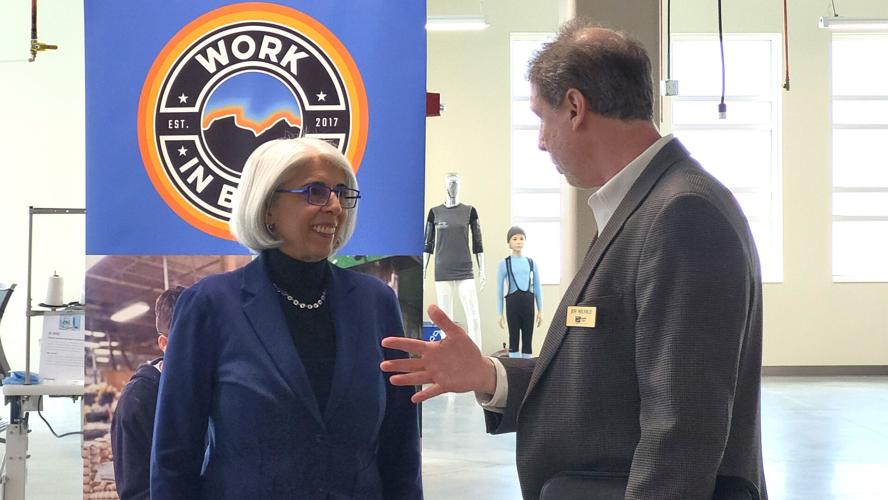A White House staffer was in Conover this week to discuss the future of the textile industry.
Arati Prabhakar is director of the White House Office of Science and Technology Policy. She visited the Catawba Valley Community College Manufacturing Solutions Center in Conover on Wednesday to discuss the future of the textile industry.
Prabhakar took a tour of the facility before a roundtable discussion with individuals representing the N.C. Textile Innovation and Sustainability Engine. The textile engine will receive $15 million for the first two years, according to a news release from the Manufacturing Solutions Center. There is the potential for another $145 million over the next three to 10 years.
Grant money will be awarded in March, the news release said.
People are also reading…
- Report: Morganton heavy metal drummer dies in crash in South Carolina. He graduated from Bunker Hill
- Catawba, Iredell men convicted of murder no longer face death, will spend lives in prison
- Newton-Conover girls, Hickory boys win holiday basketball tournament
- No bond in murder case. Blunt object used to kill woman, harm man in Mountain View on Dec. 25

Arati Prabhakar, director of the White House Office of Science and Technology Policy, left, speaks with Manufacturing Solutions Center Director Jeff Neuville before the tour of the facility.
The textile engine aims to revolutionize the textile industry by advancing environmentally sustainable textiles and wearable technology as well as reduce carbon output and the amount of textiles in landfills, according to its description on the National Science Foundation’s website.
The textile engine is a small part of the Biden administration’s bipartisan CHIPS and Science Act from 2022. There are a total of 10 engines across the country, two of which are in North Carolina. One is based in Raleigh and one is based in Gaston County.
The textile engine also ties into the Biden administration’s Investing in America plan.
Capital, infrastructure and jobs
Prabhakar said she was excited to be at the table with representatives from the organizations involved in the textile engine. Prabhakar asked the group questions about the textile industry and how the engine would benefit it.
Prabhakar asked the group where the capital comes from.
Thom Ruhe, president and CEO of NC IDEA, said that his data shows 70% of funds raised by companies working with NC IDEA comes from out of state. Ruhe said according to his data, there are over 700 sources of funding.

White House Office of Science and Technology Policy Director Arati Prabhakar, right, holds yarn created by Meridian Specialty Yarn Group while speaking with the company's Vice President of Human Resources Debbie Sigmon.
NC IDEA is a private 501(c)(3) foundation, “whose vision is to help North Carolinians achieve their entrepreneurial ambition to start and grow high potential companies,” according to its website. The foundation provides competitive grants and programs for entrepreneurs.
Ruhe said funding is coming from bigger cities farther and farther from North Carolina as time goes on, because “they don’t want to miss out on what’s happening here.”
Ruhe said the textile engine will generate more start-ups in the textile industry. The textile industry is one of the fastest growing industries in the state, Ruhe said.
“This engine project is just coming in and pouring gas on it,” Ruhe said.
David Hinks, dean of the Wilson College of Textiles at N.C. State University, said the engine will improve infrastructure.
Prabhakar asked for an example of infrastructure and how it will accelerate what the region hopes to accomplish in the textile industry.

White House Office of Science and Technology Policy Director Arati Prabhakar, right, speaks with Carolina Textile District Director Catherine Armstrong, left, and Ashley Dula-Clark, center.
Hinks said one thing the industry has been missing in infrastructure is a physical location.
“Having an ability to have a center that brings researchers (from) around the country … and connecting with the rural communities, in particular. And I think this is one of the things that makes our engine unique, I hope, is the industrial commons team is phenomenal in the way they go about supporting the local industry, and putting those together is really important. Having physical infrastructure that brings us together, I think, is a part of that,” Hinks said.
Jasmine Cox-Wade, executive director of the Textile Technology Center at Gaston College in Belmont, shared some information about the college’s two-year degree program in textile technology.
Prabhakar expressed great interest and asked several follow-up questions. One was what type of jobs people can get with that degree. The second was about potential salaries. The last was how people can prepare for the future, “because the world’s not going to stop changing.”

White House Office of Science and Technology Policy Director Arati Prabhakar speaks with Samuel Carswell of Meridian Specialty Yarn Group, Inc.
Cox-Wade said this is the second year of the program, meaning the college will have its first textile technology graduates this spring. Because it is so new, Cox-Wade said she is not yet sure what the starting salaries of graduates will be.
Cox-Wade said that some students are already working at manufacturers through work-based learning programs and have already secured a post-graduation job.

White House Office of Science and Technology Policy Director Arati Prabhakar during the roundtable discussion.
Some students are individuals who previously attended community college, Cox-Wade said, or worked hourly jobs and decided to pursue a career. The textile technology degree is accessible and affordable with scholarship opportunities, Cox-Wade said.
“It’s really giving (some students) that stability that they were looking for,” Cox-Wade said. “And really helping drive economic mobility and wealth in rural North Carolina and that’s what this grant will help us with.”















